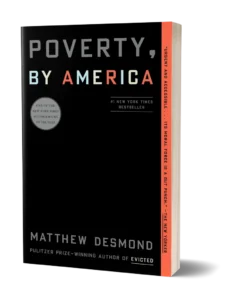What We’re Reading – Poverty, by America
For this edition of What We’re Reading, I chose Poverty, by America written by Pulitzer Prize-winning author, Matthew Desmond. The book was a gift from Danielle Staton, Executive Director of the Jeremiah Program. The Jeremiah Program is a nonprofit dedicated to disrupting the cycle of poverty for single mothers and their children by supporting single mothers of any age while they earn a college degree, so they don’t have to make the untenable choice between investing in themselves and investing in their children. 
Desmond argues that while structural and systemic factors contribute to the persistence of poverty in America, the real reason poverty persists is because we allow it to. Factors like globalization and automation contribute to the problem, but do not explain why the poverty rate in America is so much higher than that of other developed nations. “It’s a useful exercise, evaluating the merits of different explanations for poverty, like those having to do with immigration or the family,” Desmond writes. “But I’ve found that doing so always leads me back to the taproot, the central feature from which all other rootlets spring, which in our case is the simple truth that poverty is an injury, a taking. Tens of millions of Americans do not end up poor by a mistake of history or personal conduct. Poverty persists because some wish and will it to.”
This is an uncomfortable point, but Desmond makes it without villainizing any specific group of people, and in fact goes to some lengths to demonstrate that liberal or conservative; this truth holds. Despite the prevailing narrative of deep polarization between our political parties, Desmond points to the data that shows while, “Democrats are more likely than Republicans to champion public housing in the abstract, among homeowners, they are no more likely to welcome new housing developments in their own backyards. Perhaps we are not so polarized after all,” he writes. “Maybe above a certain income level, we are all segregationists.”
Desmond also challenges the notion that only conservative Americans oppose aid for the poor. While conservatives may more vocally criticize government assistance, middle and upper middle classes equally benefit (to the tune of billions of dollars) from federal aid themselves. It is just that the programs designed for those above the poverty line mostly appear in the form of tax breaks like 529 savings plans and mortgage credits. The distinction lies not in who benefits from government support, but in how that support is disguised. The end effect however is the same – we are all benefiting from government assistance and “Middle and upper-middle-class Americans, many of them proud progressives, are complicit in the taking.”
Rather than focusing on individual stories of hardship, as books about poverty so often do, Desmond focuses each chapter on a way in which we’ve allowed an unfair system to persist because we benefit from it. We underpay workers, limit the choices of the poor, force them to pay more for essential services, and defend exclusionary zoning laws that keep affordable housing – and thus low-income families – at a distance. In doing so, Desmond suggests, we have created a moral economy that normalizes inequity under the guise of meritocracy.
As it is related to philanthropy, though personal and foundation giving can help individuals, it rarely dismantles the structures that perpetuate poverty. Desmond argues, “Rather than throwing money over the wall, tear the wall down.” He says, “When the affluent and poor live separate lives, any institution or program on which only the poor relies becomes vulnerable.” There is so much poverty in America that we could make meaningful gains in equality, and there would still be miles and miles of separation between the top and the bottom.
Desmond’s argument underscores an important lesson for the philanthropic field: generosity without structural change is not enough. If we are to address the roots of poverty, we must be willing to interrogate the comfort and stability that privilege affords us, and to imagine new systems where opportunity is not hoarded but shared.
I would recommend this book to everyone. It has truly changed the way I view my own comforts and privileges, and how I protect those advantages, consciously or not, at the expense of others. I would also like to thank Danielle Staton, both for the gift of this eye-opening book and for the hard work of helping to lift single mothers and children in our community out of poverty. Though the eradication of poverty in this country requires a majority of us to want a change, in the meantime nonprofits like the Jeremiah Program support and uplift those they serve and make a meaningful difference in the lives of the individual women and their children they support.
